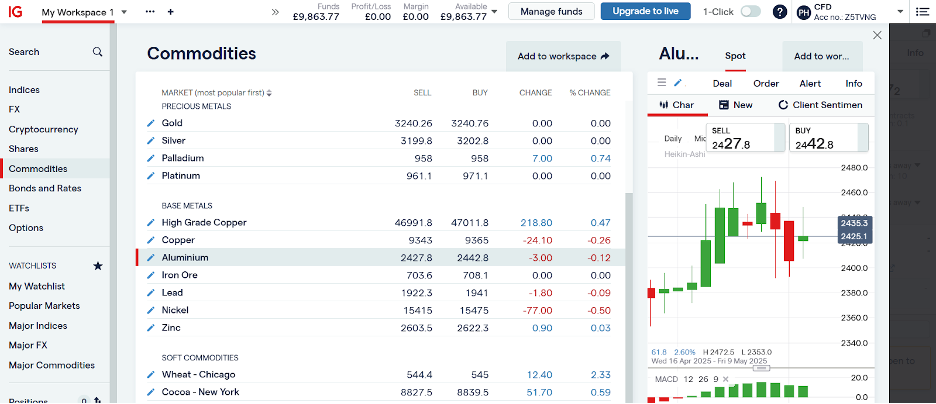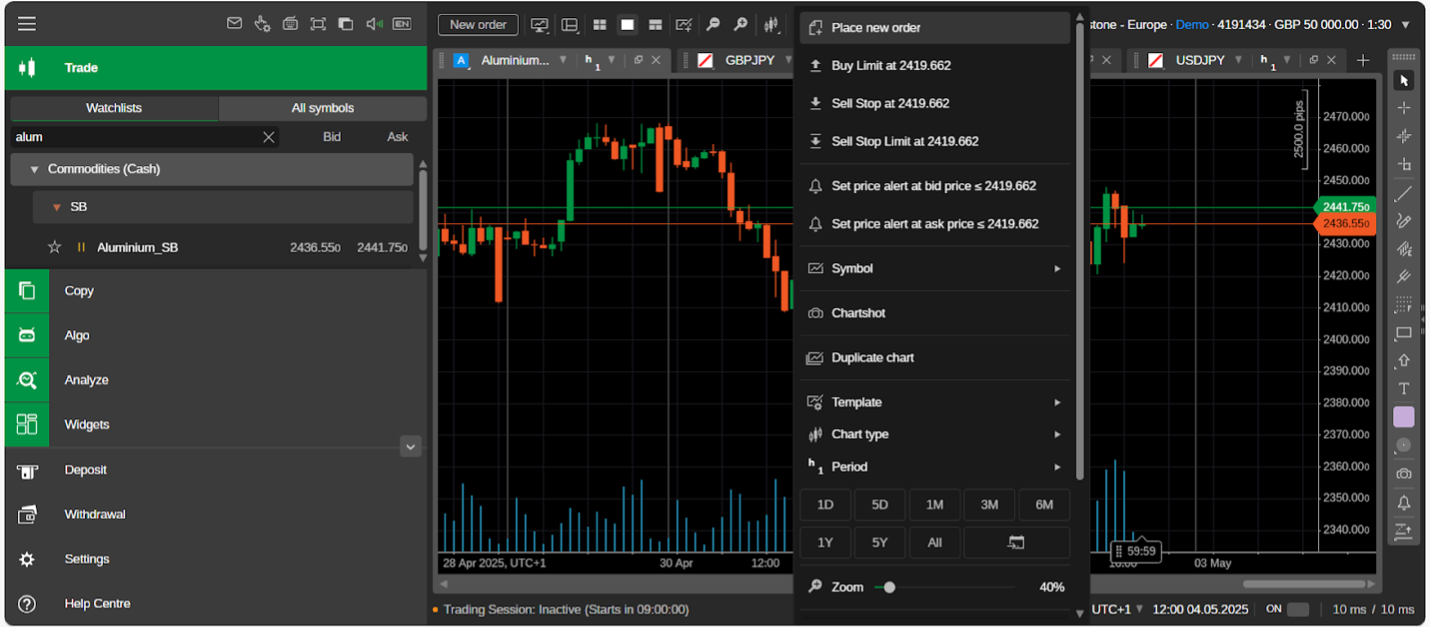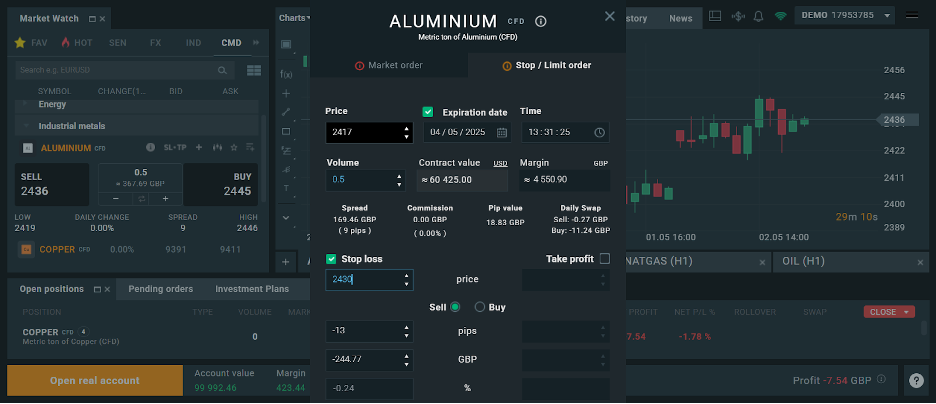Best Aluminium Brokers 2026
We’ve researched, analyzed, and ranked the best brokers for aluminium trading in 2026.
-
1Interactive Brokers (IBKR) is a top brokerage firm offering access to 150 markets in 33 countries and a range of investment services. With 40 years in the field, this company listed on Nasdaq strictly follows the rules set by authorities such as the SEC, FCA, CIRO, and SFC. It's recognized as one of the most reliable brokers for global trading.
-
2
Trust Platform Assets Fees Accounts Research Education Mobile Support 4.6 Established in 2008, Exness is a respected broker known for offering over 40 account currencies, a wide choice of CFD instruments, and an intuitive web platform with features like currency converters and trading calculators. -
3
Trust Platform Assets Fees Accounts Research Education Mobile Support 4.8 Pepperstone, established in Australia in 2010, is a highly-regarded forex and CFD broker serving more than 400,000 international clients. It provides access to over 1,300 instruments through leading trading platforms such as MT4, MT5, cTrader, and TradingView, while keeping fees relatively low and transparent. The company is regulated by known authorities including FCA, ASIC, and CySEC, offering a safe trading environment for all. -
4
Trust Platform Assets Fees Accounts Research Education Mobile Support 4.6 Trade Nation is a leading foreign exchange and contract for difference broker regulated in various areas including the UK and Australia. This company provides affordable fixed and variable spreads on over 1000 assets and strong trading platforms and educational resources. Traders could use the Signal Centre for trading ideas. -
5
Trust Platform Assets Fees Accounts Research Education Mobile Support 4.6 Fusion Markets, an online broker since 2017, is regulated by the ASIC, VFSC and FSA. Known for its low-cost forex and CFD trading, it offers a variety of accounts and copy trading options for all types of traders. New traders can register and begin trading in three easy steps.
Compare The Best Brokers For Trading Aluminium Across Key Features
We’ve tested and compared the top platforms for aluminium trading—see how they perform across key areas:
How Safe Are The Top Aluminium Trading Platforms?
When trading aluminium, platform reliability and fund protection are essential. See how leading brokers measure up:
Mobile Aluminium Trading Platforms – Compared
We evaluated mobile trading apps that support aluminium. Here’s how the top brokers perform on smartphones and tablets:
Are The Top Aluminium Trading Brokers Beginner-Friendly?
Just getting started with aluminium trading? Find out which brokers provide accessible platforms, strong learning resources, and low entry points:
Are The Top Aluminium Trading Brokers Good For Advanced Traders?
Advanced aluminium traders need precision tools and deep market access. Here’s how top-tier brokers stack up for seasoned pros:
Accounts Comparison
Compare the trading accounts offered by Best Aluminium Brokers 2026.
Detailed Ratings: Best Brokers For Trading Aluminium
Explore our in-depth ratings for the best aluminium brokers – with insights across all key metrics:
Aluminium Brokers Compared On Trading Costs
We break down trading fees and spreads to reveal the real cost of aluminium trading across top brokers:
Which Top Aluminium Trading Brokers Are Most Popular?
Discover which brokers are trusted most by aluminium traders – and why they’ve earned their reputation:
| Broker | Popularity |
|---|---|
| Interactive Brokers |
|
| Exness |
|
| Pepperstone |
|
| Fusion Markets |
|
Why Trade With Interactive Brokers?
Interactive Brokers is ideal for seasoned traders due to its robust charting platforms, updated data, and adaptability, especially with the IBKR Desktop application. Its exceptional pricing and advanced order features appeal to traders, and its variety of stocks remains unmatched in the market.
Pros
- Interactive Brokers has introduced ForecastTrader, a zero-commission service allowing users to trade yes/no Forecast Contracts on political, economic, and climate events. Contracts offer fixed $1 payouts, 24/6 market access, and a 3.83% APY on held positions.
- The new IBKR Desktop platform combines the advantages of TWS and adds unique tools like Option Lattice and Screeners with MultiSort to make trading accessible and impressive for traders of all levels.
- IBKR offers exceptional access to global stocks, with thousands of equities available from over 100 market centers in 24 countries, including the recent addition of the Saudi Stock Exchange.
Cons
- Customer service may take time to respond, and there may be delays in fixing problems based on tests. It could be difficult to reach the customer service promptly.
- TWS's platform may be difficult for beginners to grasp because of its complexity - we were overwhelmed during our initial tests by the sheer volume of tools, features and widgets.
- IBKR offers many research tools. However, the tools are not uniformly distributed across trading platforms and the web-based 'Account Management' page, causing confusion for the users.
Why Trade With Exness?
Exness is an excellent choice for active forex traders aiming to reduce costs after lowering spreads, enhancing execution speeds, and offering trading on over 100 currency pairs with more than 40 account currencies.
Pros
- Execution speeds now average under 25ms, providing ideal conditions for short-term traders.
- Fast and reliable 24/7 multilingual customer support through phone, email, and live chat, validated by practical tests.
- Wide variety of account types for all experience levels, including Cent, Pro, and the new Raw Spread, ideal for traders.
Cons
- Retail trading services are not available in some areas, including the US, UK, and EU, making them less accessible compared to leading brokers like Interactive Brokers.
- Besides a mediocre blog, educational resources are lacking, especially compared to category leaders like IG, which offer a more comprehensive trading journey for new traders.
- MetaTrader 4 and 5 are supported, but TradingView and cTrader are not available yet, despite increasing demand from traders and their integration with other platforms like Pepperstone.
Why Trade With Pepperstone?
Pepperstone is a leading choice for trading with low spreads, quick execution, and advanced charting for experienced traders. New traders benefit from no minimum deposit, a wealth of educational resources, and 24/7 support. Operating under ASIC regulation, Pepperstone is a top option for Australian traders and won DayTrading.com's 'Best Aus Broker' award for 2025.
Pros
- Pepperstone now offers spread betting via TradingView, enabling tax-efficient trading with sophisticated analysis tools.
- Pepperstone has simplified deposits and withdrawals, adding Apple Pay and Google Pay in 2025, and PIX and SPEI for Brazilian and Mexican clients in 2024.
- Pepperstone is a low-cost broker, ideal for serious traders. The Razor account offers spreads from 0.0, with rebates up to 30% for indices and commodities, and $3 per lot for forex through the Active Trader program.
Cons
- Despite expanding its market range, crypto options are limited compared to other brokers in this area, and there is no option to invest in actual coins.
- Pepperstone does not support cTrader Copy, a popular feature in the cTrader platform available at alternatives like IC Markets, though it has launched an intuitive copy trading app.
- Pepperstone's demo accounts last for 30 days. This might be insufficient for learning the various platforms and testing trading strategies.
Why Trade With Trade Nation?
Trade Nation is a suitable platform for new traders, offering diverse financial markets in a user-friendly environment. It has no minimum deposit requirement, provides free funding options, and robust educational resources.
Pros
- Beginners can start trading with a small initial deposit.
- The brand offers a variety of trading platforms and apps, like MT4, suitable for skilled traders.
- Global traders can trade using various account currencies.
Cons
- Lower legal safeguards with overseas businesses.
Why Trade With Fusion Markets?
Fusion Markets is a top choice for forex traders seeking competitive prices with near zero spreads, minimal commissions, and new TradingView integration. The company, based and regulated in Australia by the ASIC, is especially suitable for Australian traders.
Pros
- The variety and quality of charting platforms and social trading features are superb. TradingView, MT4, MT5, and cTrader cater to diverse trading preferences.
- Fusion Markets provides superior support with quick and friendly responses during evaluations. There is no need to deal with annoying automated chatbots.
- Fusion Markets offers a supported VPS solution for algorithmic traders, including a 25% discount if they choose the NYC Servers VPS for their MT4 or cTrader platforms.
Cons
- The demo account lasts for 30 days, reducing its usefulness as a trading tool together with a real-money account.
- Non-Australian traders need to register with global entities that have less regulation, limited safety measures, and no protection against negative balances.
- Fusion Market lags behind alternatives like IG in education, offering limited guides and live video sessions to help new traders improve.
Filters
How We Chose The Best Brokers For Trading Aluminium
We dove into our continually updated broker database to find those offering the strongest support for aluminium trading—whether through spot contracts, futures, or leveraged CFDs.
Each broker was scored using our proprietary 200-point system, which evaluates eight critical dimensions including platform functionality, pricing, and research capabilities.
We also conducted in-depth hands-on testing, considering how well each broker facilitates aluminium trading—from execution and charting tools to risk management and mobile compatibility.

What to Look For in a Top Aluminium Broker
After years of evaluating brokers across commodities, we know what sets apart the best platforms for aluminium trading. Here’s what to prioritize:
Market Access: Go Where the Aluminium Action Is
If you’re serious about trading aluminium, the first thing you must check is whether your broker gives you access to the right markets.
It sounds obvious, but you’d be surprised how many platforms we’ve tested only offer indirect or minimal access—maybe a couple of aluminium-related ETFs or the odd CFD—and call it a day. That’s just not good enough if you want to trade with precision.
Ideally, you want direct access to aluminium futures contracts on major global exchanges, like the London Metal Exchange (LME) or the Chicago Mercantile Exchange (CME). These are the real hubs of aluminium price discovery, and they’re where the big money moves.
If you’re more into synthetic exposure (maybe you’re working with a smaller account or just testing the waters), aluminium or broader base metal CFDs and ETFs can also be acceptable. But again, quality and variety matter.
Top Pick: We’ve tested and reviewed all the big names, opened live or demo accounts, and not just read the marketing brochures. IG stands out when it comes to reliable, flexible market access for aluminium trading.
IG gives you the wide-angle access we are looking for. Whether you’re after aluminium futures tied to the CME or you’d rather trade synthetic exposure through aluminium-linked CFDs or even broader commodity ETFs, IG’s product range is deep and built with metals traders in mind.

You can load an aluminium chart and order in a few clicks on IG’s web platform
Aluminium-Specific Research and Insights
Aluminium prices don’t just shift on a whim; they move on fundamentals. We’re talking about global supply chain disruptions, energy prices, mining activity, and significant shifts in demand, such as the boom in electric vehicles and green infrastructure.
Add in geopolitical tensions with big producers like China, Russia, and Brazil, and you’ve got a market where context is king.
That’s why it’s so important to choose a broker that doesn’t just offer access to aluminium, but also helps you understand it. And by that, we mean fundamental, in-depth research. Not just generic weekly newsletters or a few recycled Reuters headlines, but valuable insights into what’s happening in the aluminium world.
We’re looking for coverage of EV battery trends, refinery output, mining disruptions, LME inventory shifts, and all the subtle supply-demand signals that matter to serious traders.
Top Pick: During our hands-on testing, XTB impressed us the most in this department. They’ve put real effort into building a research hub that’s not just FX-focused but covers commodities, including aluminium, with genuine insight.
Their market analysis frequently touches on big themes like China’s energy curbs, car manufacturers, aerospace demand, and even how Canadian smelter strikes or Australian bauxite shortages could impact global supply.
We liked that the research isn’t buried or half-baked. It’s built right into the platform, easy to access, and often backed by accurate economic data, not just speculation. Plus, their analysts don’t shy away from linking aluminium’s price action to broader geopolitical themes, precisely what you want if you’re looking to trade with an edge.
Execution Speed and Reliability
In the aluminium market, prices can jump or drop on a dime. A sudden inventory report, fresh sanctions on a producer, or even whispers about Chinese output cuts can trigger fast, sharp moves.
So when you hit buy or sell, you want that order to fire off instantly. Not a second later.
Top Pick: We’ve stress-tested execution speeds across multiple platforms, using live accounts and tracking fills during real-time market events. Pepperstone consistently delivered a rock-solid performance, primarily through the cTrader (Spotware) platform. Whether we were trading CFDs on aluminium or placing limit orders around macro news drops, their execution was crisp and fast.
No freezing, no annoying delays. Orders went through quickly, even during peak volatility. That kind of speed matters when you’re scalping moves off LME price spikes or reacting to a sharp shift in China’s industrial output data.
And reliability? We didn’t experience a single disconnect or platform wobble during our test window—not even when metals markets got choppy.

Pepperstone offers the powerful cTrader software that proved reliable for trading aluminium during testing
Data Feeds and Charts
Aluminium traders don’t just stare at price candles; we track global inventory shifts, seasonal patterns, and those all-important LME and CME price feeds.
You can’t trade metals like you trade meme stocks; you need real-time, high-quality data and charts that work for commodities. That means:
- Live access to LME/CME aluminium prices
- Inventory data (especially LME warehouse updates)
- Pro-level charting with commodity-specific indicators like Bollinger Bands, MACD, RSI, and volume overlays tailored for metals
Top Pick: When we dug into platform tools, Fusion Markets stood out. Their integration with TradingView and MetaTrader means you get flexible, customizable charts with aluminium-specific overlays, and access to real-time data that updates when you need it most. While direct LME pricing can sometimes come with a data fee, Fusion keeps things clean and straightforward, and the quality of the feeds is solid.
In our tests, the charts updated in real time with no noticeable lag, and the platform let us set up price alerts for key aluminium levels; something we use constantly when trading off inventory reports or geopolitical headlines.
Regulatory Oversight and Broker Credibility
When trading something as globally sensitive as aluminium, where prices can be swayed by sanctions, tariffs, and surprise production quotas, you don’t want to do business with a fly-by-night operation. This is a market where credibility counts.
At a minimum, your broker should be regulated by a top-tier authority—think CFTC, (US) ASIC (Australia), FCA (UK), CySEC (EU), or similar.
But regulation alone isn’t enough. You also want a broker with a solid history in metals trading, not just FX and indices. Experience in handling fast-moving, globally traded assets like aluminium adds a layer of trust you just can’t fake.
Top Pick: Of all the platforms we’ve tested, IG stands out again here. They’ve been around for decades, are regulated across multiple jurisdictions, and have long offered access to hard commodities like aluminium. We’ve seen firsthand how their risk disclosures, client fund protections, and platform stability hold up, even when markets get messy.
Fees and Commissions
Commodity markets, including aluminium, don’t always move in huge, trendy waves. Sometimes it’s tight, technical trading where every tick matters. And if your broker’s spreads or commissions are too high, those slim gains disappear quickly.
So you need a broker with tight spreads or low commissions on aluminium trades, whether you’re quickly in and out of positions or holding through macro cycles. And ideally, they’re transparent about pricing; no hidden fees, no nasty surprises.
Top Pick: We’ve run side-by-side tests using identical positions, and Fusion Markets consistently delivered some of the lowest costs we found. Their spreads on aluminium CFDs were razor-sharp during liquid and less active sessions. Plus, their commission structure is fair and straightforward, perfect for traders who don’t want to burn capital on overhead.
Risk Management Tools
Aluminium can be smooth one day and wild the next. A warehouse fire, a Chinese export ban, or an unexpected energy policy can trigger massive price swings. If you’re not managing your exposure properly, you can easily get caught on the wrong side of the coin.
That’s why solid risk management tools aren’t optional but essential. We’re talking:
- Stop-loss and take-profit orders
- Custom price alerts for key levels
- Volatility warnings or margin call notifications
- Position size calculators or risk percentage overlays
Top Pick: We’ve tested platforms under real market pressure, and XTB did an excellent job of helping us manage risk while trading aluminium without complicating the workflow.
Their interface makes it super easy to set up protective orders when you place a trade, and alerts are highly customizable, down to specific percentage moves or price triggers. We especially liked the clean design of their mobile alerts, which helped us stay in the loop even when away from the screen.

XTB has one of the most beginner-friendly platforms for trading aluminium from our hands-on tests




